Saturday, September 18, 2010
Our Blessed Lady's Saturday

O most holy Virgin, Mother of our Lord Jesus Christ: by the overwhelming grief thou experienced when thou witnessed the martyrdom, the crucifixion, and death of thy divine Son, look upon me with eyes of compassion, and awaken in my heart a tender commiseration for those sufferings, as well as a sincere detestation of my sins, in order that, being disengaged from all undue affection for the passing joys of this earth, I may sigh after the eternal Jerusalem, and that henceforward all my thoughts and all my actions may be directed towards this one most desirable object. Honor, glory, and love to our divine Lord Jesus, and to the holy and immaculate Mother of God.
Amen.
Labels: Our Blessed Lady
Friday, September 17, 2010
Friday At the Foot Of the Cross

Prayer by Saint Alphonsus de Liguori:
Ah, Father of mercies! Thou dost not abandon him who seeks Thee. Thou hast not forsaken them that seek Thee, O Lord.29 I have hitherto turned my back upon Thee so often, and Thou hast not abandoned me: do not abandon me now that I seek Thee. I repent, O Sovereign Good! of having made so little account of Thy grace, which I have exchanged for nothing. Look at the wounds of Thy Son. Listen to his cries, which implore Thee to pardon me; and grant me pardon. O my Redeemer! remind me always of the pains Thou hast suffered for me, of the love Thou hast borne me, and of my ingratitude, by which I have so often deserved hell, that I may always bewail the injury I have done Thee, and that I may live always burning with Thy love. Ah, my Jesus! how can I but burn with Thy love, when I reflect that for so many years I ought to burn in hell, and continue to burn in it for all eternity; when I remember that Thou hast died in order to deliver me from it, and that Thou hast with so much mercy rescued me from that land of misery! Were I in hell, I should now hate Thee there, and should have to hate Thee forever: but now I love Thee, and will love Thee forever. Thou lovest me, and I also love Thee. Thou wilt love me forever unless I forsake Thee. Ah, my Saviour! save me from the misfortune of ever leaving Thee, and then do with me whatsoever Thou pleasest. I merit every punishment, and I accept every chastisement, that Thou mayest deliver me from the punishment of being deprived of Thy love. O Mary, my refuge! how often have I condemned myself to hell, and thou hast preserved me from it. Ah, deliver me now from sin, which alone can deprive me of the grace of God, and bring me to hell.
Amen.
Labels: Friday At the Foot Of the Cross
Wednesday, September 15, 2010
Mid-Week Mix
The Wolfe Tones, Boston Rose
Johnny McEvoy, The Boston Burglar
The Kingston Trio, Charlie On the MTA
The Dropkick Murphys, Shipping Up To Boston
Freddie Hall, Southie Is My Hometown
The Dropkick Murphys, The State Of Massachusetts
Mychael & Jeff Danna, The Blood of Cu Chulainn
Boston College Marching Band, For Boston
Bonus Tracks
Lower Class Boston Accent 1
Lower Class Boston Accent 2
Lower Class Boston Accent 3
Upper Class Boston Accent
Johnny McEvoy, The Boston Burglar
The Kingston Trio, Charlie On the MTA
The Dropkick Murphys, Shipping Up To Boston
Freddie Hall, Southie Is My Hometown
The Dropkick Murphys, The State Of Massachusetts
Mychael & Jeff Danna, The Blood of Cu Chulainn
Boston College Marching Band, For Boston
Bonus Tracks
Lower Class Boston Accent 1
Lower Class Boston Accent 2
Lower Class Boston Accent 3
Upper Class Boston Accent
Labels: Pleasing Tunes
Our Blessed Lady's Sorrows
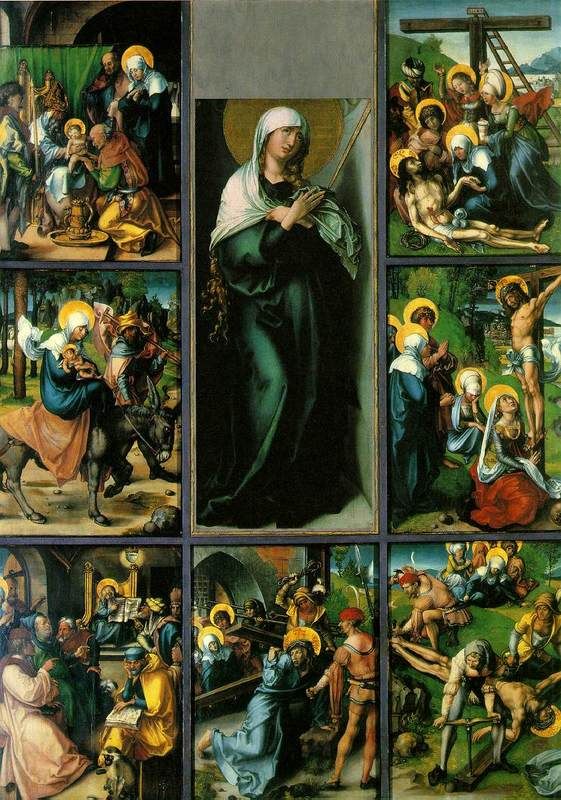
Sea of Sorrow
Oh! on what a sea of sorrow
Was the Virgin-Mother cast,
When her eyes with tears o'erflowing
Gazed upon her Son aghast,
From the bloodstained gibbet taken,
Dying in her arms at last.
In her bitter desolation,
His sweet mouth, His bosom too,
Then His riven side beloved,
Then each hand, both wounded through,
Then His feet, with blood encrimsoned,
Her maternal tears bedew.
She, a hundred times and over,
Strains Him closely to her breast
Heart to Heart, arms arms enfolding,
Are His wounds on her impressed:
Thus, in sorrow's very kisses,
Melts her anguished soul to rest.
Oh, dear Mother! we beseech thee,
By the tears thine eyes have shed,
By the cruel death of Jesus
And His wounds' right royal red,
Make our hearts o'erflow with sorrow
From thy heart's deep fountainhead.
To the Father, Son, and Spirit,
Now we bend on equal knee:
Glory, sempiternal glory,
To the Most High Trinity;
Yea! perpetual praise and honor
Now and through all ages be.
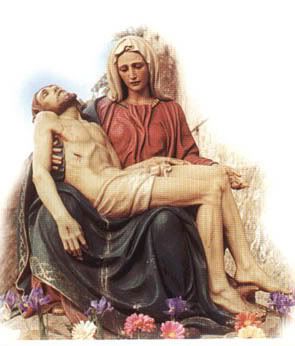
Novena Prayer To Our Sorrowful Mother
Most Blessed and afflicted Virgin, Queen of Martyrs, who didst stand generously beneath the cross, beholding the agony of thy dying Son; by the sword of sorrow which then pierced thy soul, by the sufferings of thy sorrowful life, by the unutterable joy which now more than repays thee for them; look down with a mother's pity and tenderness, as I kneel before thee to compassionate thy sorrows, and to lay my petition with childlike confidence in thy wounded heart. I beg of thee, O my Mother, to plead continually for me with thy Son, since He can refuse thee nothing, and through the merits of His most sacred Passion and Death, together with thy own sufferings at the foot of the cross, so to touch His Sacred Heart, that I may obtain my request,
For to whom shall I fly in my wants and miseries, if not to thee, O Mother of mercy, who, having so deeply drunk the chalice of thy Son, canst most pity us poor exiles, still doomed to sigh in this vale of tears? Offer to Jesus but one drop of His Precious Blood, but one pang of His adorable Heart; remind Him that thou art our life, our sweetness, and our hope, and thou wilt obtain what I ask, through Jesus Christ our Lord. Amen.
Hail Mary
Virgin Most Sorrowful, pray for us
(Seven times each)
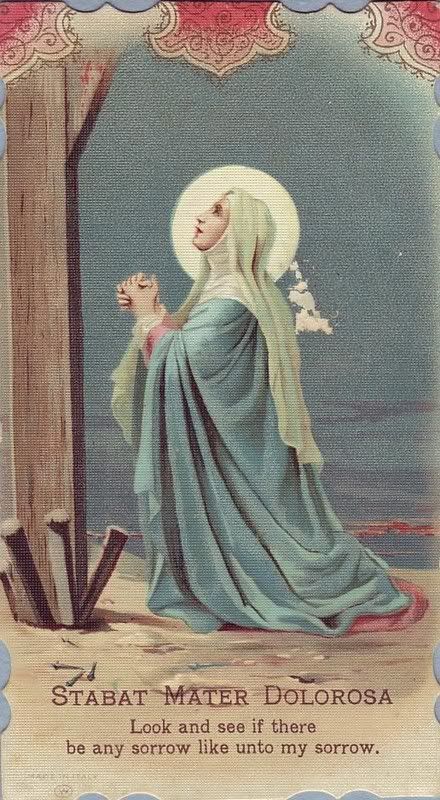
Mary, most holy Virgin and Queen of Martyrs, accept the sincere homage of my filial affection. Into thy Heart, pierced by so many swords, do thou welcome my poor soul. Receive it as the companion of thy sorrows at the foot of the Cross, on which Jesus died for the redemption of the world. With thee, O sorrowful Virgin, I will gladly suffer all the trials, contradictions, and infirmities which it shall please Our Lord to send me. I offer them all to thee in memory of thy sorrows, so that: every thought of my mind and every beat of my heart may be an act of compassion and of love for thee. And do thou, sweet Mother, have pity on me, reconcile me to thy Divine Son, Jesus; keep me in His grace and assist me in my last agony, so that I may be able to meet thee in Heaven and sing thy glories.
Most holy Virgin and Mother, whose soul was pierced by a sword of sorrow in the Passion of thy Divine Son, and who in His glorious Resurrection wast filled with never ending joy at His triumph, obtain for us who call upon thee, so to be partakers in the adversities of Holy Church and the Sorrows of the Sovereign Pontiff, as to be found worthy to rejoice with them in the consolations for which we pray, in the charity and peace of the same Christ our Lord.
Amen.

Litany of the Seven Sorrows
For private use only.
Lord, have mercy on us.
Christ, have mercy on us.
Lord, have mercy on us.
Christ, hear us.
Christ, graciously hear us.
God the Father of Heaven,
Have mercy on us.
God the Son, Redeemer of the world,
Have mercy on us.
God the Holy Spirit,
Have mercy on us.
Holy Trinity, One God,
Have mercy on us.
Holy Mary,
Pray for us.
Holy Mother of God,
Pray for us.
Holy Virgin of virgins, etc.
Mother crucified,
Mother sorrowful,
Mother tearful,
Mother afflicted,
Mother forsaken,
Mother desolate,
Mother bereft of thy Child,
Mother transfixed with the sword,
Mother consumed with grief,
Mother filled with anguish,
Mother crucified in heart,
Mother most sad,
Fountain of tears,
Abyss of suffering,
Mirror of patience,
Rock of constancy,
Anchor of confidence,
Refuge of the forsaken,
Shield of the oppressed,
Subduer of the unbelieving,
Comfort of the afflicted,
Medicine of the sick,
Strength of the weak,
Harbor of the wrecked,
Allayer of tempests,
Resource of mourners,
Terror of the treacherous,
Treasure of the faithful,
Eye of the Prophets,
Staff of the Apostles,
Crown of Martyrs,
Light of confessors,
Pearl of virgins,
Consolation of widows,
Joy of all Saints,
Lamb of God, Who takest away the sins of the world,
Spare us, O Lord.
Lamb of God, Who takest away the sins of the world,
Graciously hear us, O Lord.
Lamb of God, Who takest away the sins of the world,
Have mercy on us.
Look down upon us, deliver us, and save us from all trouble,
in the power of Jesus Christ. Amen.
Let Us Pray.
Imprint, O Lady, thy wounds upon my heart, that I may read therein sorrow and love
--- sorrow to endure every sorrow for thee, love to despise every love for thee. Amen.
Conclude with the Apostles Creed, Hail Holy Queen, and three Hail Marys,
in honor of the Most Holy Heart of Mary.
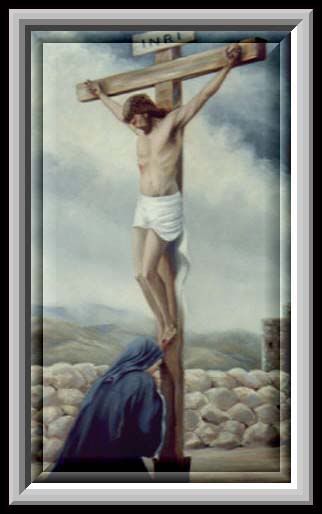
Stabat Mater Dolorosa
Stabat mater dolorosa
iuxta Crucem lacrimosa,
dum pendebat Filius.
Cuius animam gementem,
contristatam et dolentem
pertransivit gladius.
O quam tristis et afflicta
fuit illa benedicta,
mater Unigeniti!
Quae maerebat et dolebat,
pia Mater, dum videbat
nati poenas inclyti.
Quis est homo qui non fleret,
matrem Christi si videret
in tanto supplicio?
Quis non posset contristari
Christi Matrem contemplari
dolentem cum Filio?
Pro peccatis suae gentis
vidit Iesum in tormentis,
et flagellis subditum.
Vidit suum dulcem Natum
moriendo desolatum,
dum emisit spiritum.
Eia, Mater, fons amoris
me sentire vim doloris
fac, ut tecum lugeam.
Fac, ut ardeat cor meum
in amando Christum Deum
ut sibi complaceam.
Sancta Mater, istud agas,
crucifixi fige plagas
cordi meo valide.
Tui Nati vulnerati,
tam dignati pro me pati,
poenas mecum divide.
Fac me tecum pie flere,
crucifixo condolere,
donec ego vixero.
Iuxta Crucem tecum stare,
et me tibi sociare
in planctu desidero.
Virgo virginum praeclara,
mihi iam non sis amara,
fac me tecum plangere.
Fac, ut portem Christi mortem,
passionis fac consortem,
et plagas recolere.
Fac me plagis vulnerari,
fac me Cruce inebriari,
et cruore Filii.
Flammis ne urar succensus,
per te, Virgo, sim defensus
in die iudicii.
Christe, cum sit hinc exire,
da per Matrem me venire
ad palmam victoriae.
Quando corpus morietur,
fac, ut animae donetur
paradisi gloria. Amen.
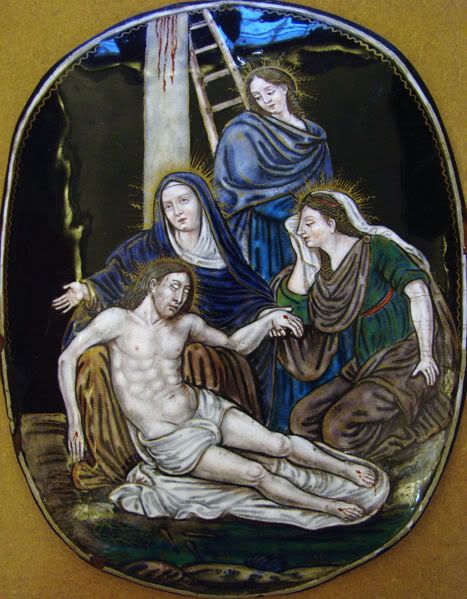
Prayer To Our Lady of Sorrows, by St. Bridget
O Blessed Virgin Mary, Immaculate Mother of God, who didst endure a martyrdom of love and grief beholding the sufferings and sorrows of Jesus! Thou didst cooperate in the benefit of my redemption by thine innumerable afflictions and by offering to the Eternal Father His only begotten Son as a holocaust and victim of propitiation for my sins. I thank thee for the unspeakable love which led thee to deprive thyself of the Fruit of thy womb, Jesus, true God and true Man, to save me, a sinner. Oh, make use of the unfailing intercession of thy sorrows with the Father and the Son, that I may steadfastly amend my life and never again crucify my loving Redeemer by new sins, and that, persevering till death in His grace. I may obtain eternal life through the merits of His Cross and Passion. Amen.
Mother of love, of sorrow and of mercy, pray for us.

Saint Alphonsus Liguori's Prayer To The Mother Of Sorrows
O, my Blessed Mother, it is not one sword only with which I have pierced thy heart, but I have done so with as many as are the sins which I have committed. O, Lady, it is not to thee, who art innocent, that sufferings are due, but to me, who am guilty of so many crimes. But since thou hast been pleased to suffer so much for me, by thy merits, obtain me great sorrow for my sins, and patience under the trials of this life, which will always be light in comparison with my demerits; for I have often deserved Hell.
Amen.
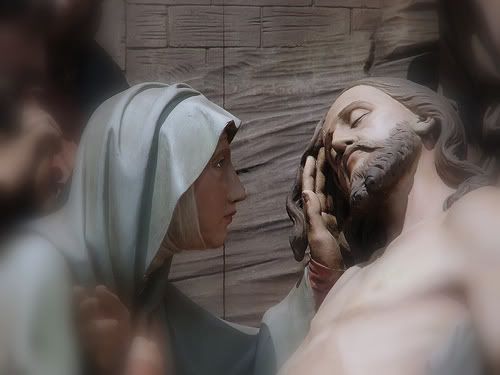
Labels: Our Blessed Lady
Tuesday, September 14, 2010
Roodmass
Also known as Exaltation Of the True Cross
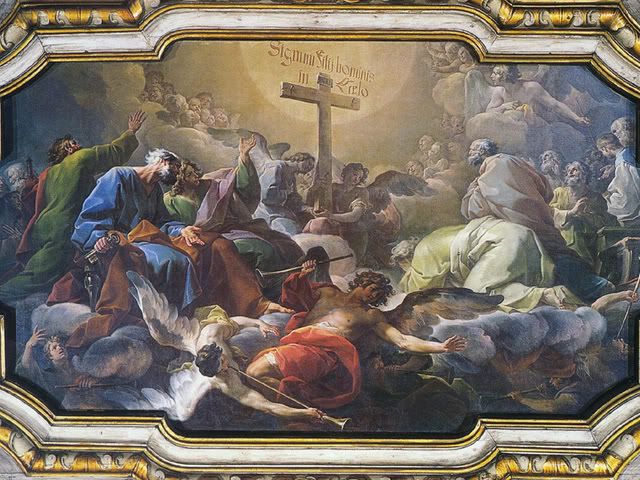
The Golden Legend
The Catholic Encyclopedia on the True Cross
Wikipedia
Fisheaters
Some images of what are said to be relics of the True Cross


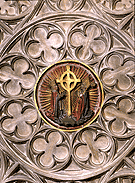
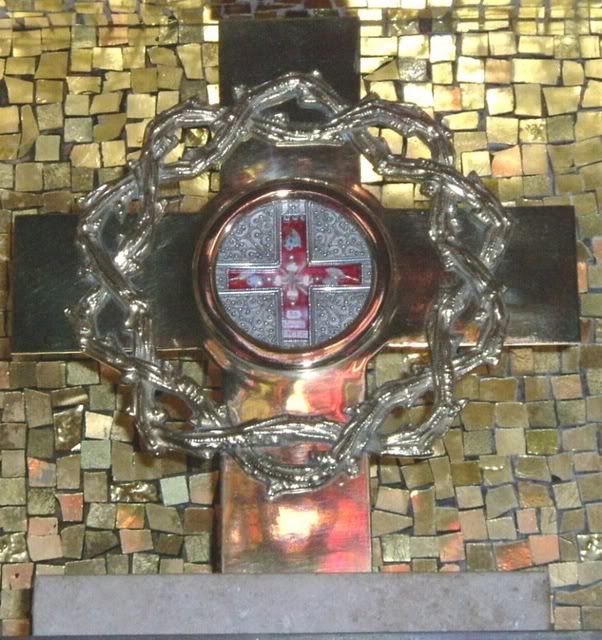
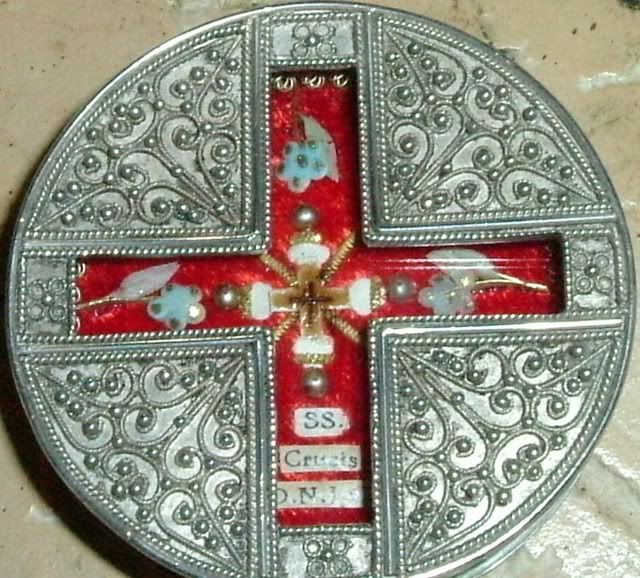
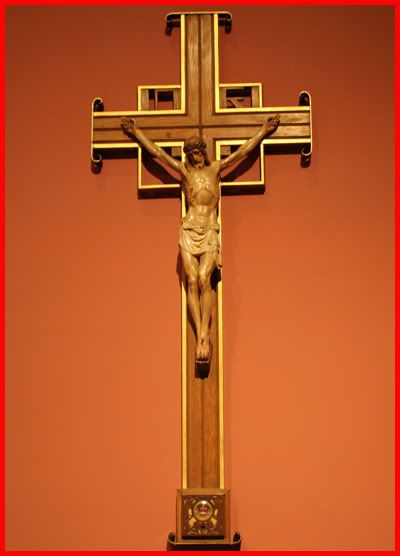

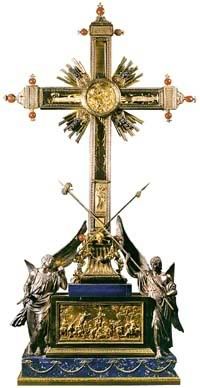
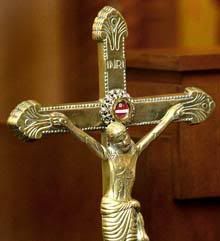
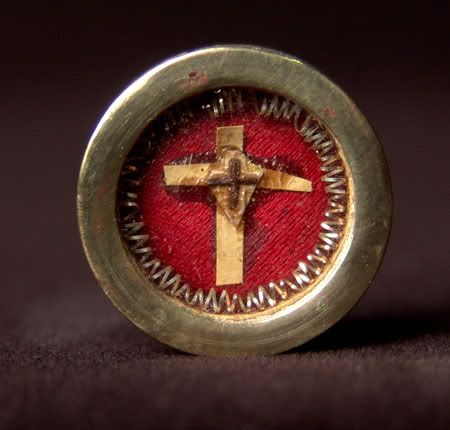
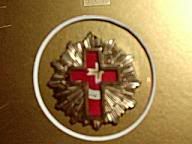
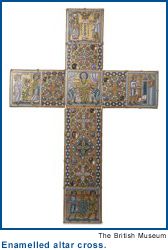

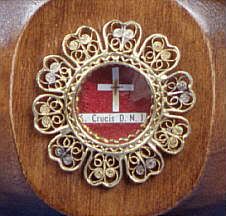
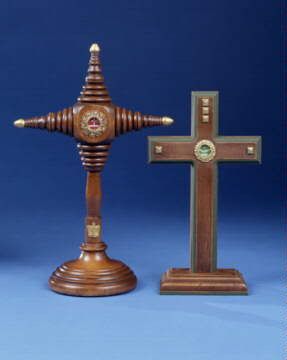
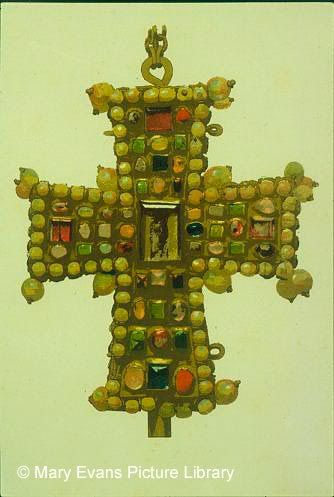
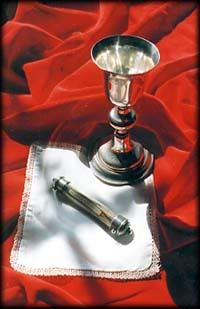
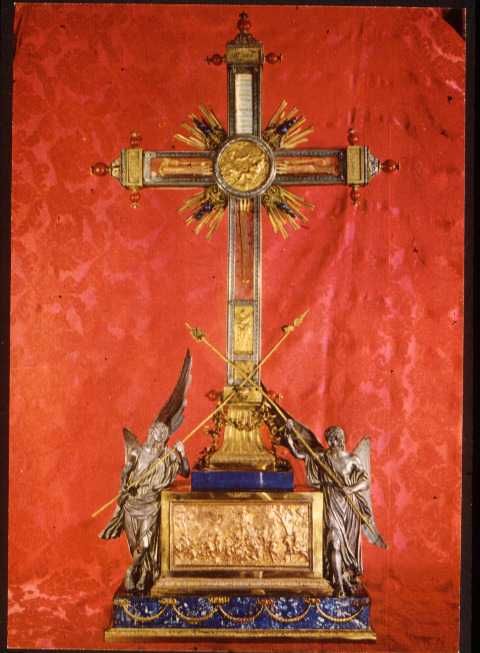
Scoffers love to repeat the old saw that, if all the alleged relics of the True Cross were brought together, you could re-build Noah's Ark, but in fact, all the pieces are quite small, most just splinters.
"In 1870 a Frenchman, Rohault de Fleury, catalogued all the relics of the True Cross including relics that were said to have existed but were lost. He measured the existing relics and estimated the volume of the missing ones. Then he added up the figures and discovered that the fragments, if glued together, would not have made up more than one-third of a cross."
Litany of the Holy Cross
For Private Use Only.
Lord, have mercy.
Lord, have mercy.
Christ, have mercy.
Christ, have mercy.
Lord, have mercy.
Lord, have mercy.
Christ, hear us.
Christ, graciously hear us.
God the Father of Heaven,
Have mercy on us.
God the Son, Redeemer of the world,
Have mercy on us.
God the Holy Ghost, our Advocate,
Have mercy on us.
Holy Trinity, one God,
Have mercy on us.
Holy Cross whereon the Lamb of God was offered,
Save us, O Holy Cross.
Hope of Christians,
Save us, O Holy Cross.
Pledge of the resurrection of the dead, etc.
Shelter of persecuted innocence,
Guide of the blind,
Way of those who have gone astray,
Staff of the lame,
Consolation of the poor ,
Restraint of the powerful,
Destruction of the proud,
Refuge of sinners,
Trophy of victory over Hell,
Terror of demons,
Mistress of youth,
Succor of the distressed,
Hope of the hopeless,
Star of the mariner,
Harbor of the wrecked,
Rampart of the besieged,
Father of orphans,
Defense of widows,
Counsel of the just,
Judge of the wicked,
Rest of the afflicted,
Safeguard of childhood,
Strength of manhood,
Last hope of the aged,
Light of those who sit in darkness,
Splendor of kings,
Civilizer of the world,
Shield impenetrable,
Wisdom of the foolish,
Liberty of slaves,
Knowledge of the ignorant,
Sure rule of life,
Heralded by Prophets,
Preached by Apostles,
Glory of Martyrs,
Study of hermits,
Chastity of virgins,
Joy of priests,
Foundation of the Church,
Salvation of the world,
Destruction of idolatry,
Stumbling block to the Jews,
Condemnation of the ungodly,
Support of the weak,
Medicine of the sick,
Health of the leprous,
Strength of the paralytic,
Bread of the hungry,
Fountain of those who thirst,
Clothing of the naked,
Lamb of God, Who takest away the sins of the world,
Spare us, O Lord.
Lamb of God, Who takest away the sins of the world,
Hear us, O Lord.
Lamb of God, Who takest away the sins of the world,
Have mercy on us.
Christ, hear us.
Christ, graciously hear us.
Lord, have mercy.
Christ, have mercy.
Lord, have mercy.
V. We adore Thee, O Christ, and we praise Thee,
R. Because by Thy Holy Cross Thou hast redeemed the world.
[Together] Behold the Cross of the Lord! Begone ye evil powers!
The Lion of the tribe of Juda, the Root of David, has conquered! Alleluia!
Let Us Pray.
O God, Who for the redemption of the world, wast pleased to be born in a stable and to die upon a cross; O Lord Jesus Christ, by Thy holy sufferings, which we, Thy unworthy servants, call to mind: by Thy Holy Cross, and by Thy death, deliver us from the pains of Hell, and vouchsafe to conduct us whither Thou didst conduct the good thief who was crucified with Thee, Who livest and reignest eternally in Heaven. R. Amen.
Sweet the wood, sweet the nails,
sweet the Burden which thou bearest,
for thou alone, O Holy Cross,
wast worthy to bear the King and Lord of Heaven.
R. Amen.
This litany, which has come down to us from the Middle Ages and from many countries, should not be thought to be addressed to an inanimate object, great relic though it is, but rather, to Him who hung upon it and thereby redeemed us all. By our salutation to the chief instrument of Our Lord's Passion and death, we hope and we trust that He will show mercy to us.
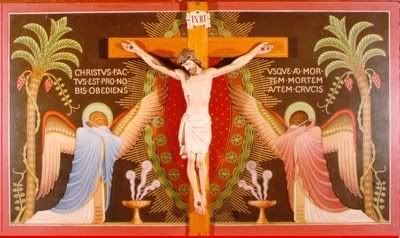

The Golden Legend
The Catholic Encyclopedia on the True Cross
Wikipedia
Fisheaters
Some images of what are said to be relics of the True Cross


















Scoffers love to repeat the old saw that, if all the alleged relics of the True Cross were brought together, you could re-build Noah's Ark, but in fact, all the pieces are quite small, most just splinters.
"In 1870 a Frenchman, Rohault de Fleury, catalogued all the relics of the True Cross including relics that were said to have existed but were lost. He measured the existing relics and estimated the volume of the missing ones. Then he added up the figures and discovered that the fragments, if glued together, would not have made up more than one-third of a cross."
Litany of the Holy Cross
For Private Use Only.
Lord, have mercy.
Lord, have mercy.
Christ, have mercy.
Christ, have mercy.
Lord, have mercy.
Lord, have mercy.
Christ, hear us.
Christ, graciously hear us.
God the Father of Heaven,
Have mercy on us.
God the Son, Redeemer of the world,
Have mercy on us.
God the Holy Ghost, our Advocate,
Have mercy on us.
Holy Trinity, one God,
Have mercy on us.
Holy Cross whereon the Lamb of God was offered,
Save us, O Holy Cross.
Hope of Christians,
Save us, O Holy Cross.
Pledge of the resurrection of the dead, etc.
Shelter of persecuted innocence,
Guide of the blind,
Way of those who have gone astray,
Staff of the lame,
Consolation of the poor ,
Restraint of the powerful,
Destruction of the proud,
Refuge of sinners,
Trophy of victory over Hell,
Terror of demons,
Mistress of youth,
Succor of the distressed,
Hope of the hopeless,
Star of the mariner,
Harbor of the wrecked,
Rampart of the besieged,
Father of orphans,
Defense of widows,
Counsel of the just,
Judge of the wicked,
Rest of the afflicted,
Safeguard of childhood,
Strength of manhood,
Last hope of the aged,
Light of those who sit in darkness,
Splendor of kings,
Civilizer of the world,
Shield impenetrable,
Wisdom of the foolish,
Liberty of slaves,
Knowledge of the ignorant,
Sure rule of life,
Heralded by Prophets,
Preached by Apostles,
Glory of Martyrs,
Study of hermits,
Chastity of virgins,
Joy of priests,
Foundation of the Church,
Salvation of the world,
Destruction of idolatry,
Stumbling block to the Jews,
Condemnation of the ungodly,
Support of the weak,
Medicine of the sick,
Health of the leprous,
Strength of the paralytic,
Bread of the hungry,
Fountain of those who thirst,
Clothing of the naked,
Lamb of God, Who takest away the sins of the world,
Spare us, O Lord.
Lamb of God, Who takest away the sins of the world,
Hear us, O Lord.
Lamb of God, Who takest away the sins of the world,
Have mercy on us.
Christ, hear us.
Christ, graciously hear us.
Lord, have mercy.
Christ, have mercy.
Lord, have mercy.
V. We adore Thee, O Christ, and we praise Thee,
R. Because by Thy Holy Cross Thou hast redeemed the world.
[Together] Behold the Cross of the Lord! Begone ye evil powers!
The Lion of the tribe of Juda, the Root of David, has conquered! Alleluia!
Let Us Pray.
O God, Who for the redemption of the world, wast pleased to be born in a stable and to die upon a cross; O Lord Jesus Christ, by Thy holy sufferings, which we, Thy unworthy servants, call to mind: by Thy Holy Cross, and by Thy death, deliver us from the pains of Hell, and vouchsafe to conduct us whither Thou didst conduct the good thief who was crucified with Thee, Who livest and reignest eternally in Heaven. R. Amen.
Sweet the wood, sweet the nails,
sweet the Burden which thou bearest,
for thou alone, O Holy Cross,
wast worthy to bear the King and Lord of Heaven.
R. Amen.
This litany, which has come down to us from the Middle Ages and from many countries, should not be thought to be addressed to an inanimate object, great relic though it is, but rather, to Him who hung upon it and thereby redeemed us all. By our salutation to the chief instrument of Our Lord's Passion and death, we hope and we trust that He will show mercy to us.

Labels: Holy Cross
Sunday, September 12, 2010
The Sixteenth Sunday After Pentecost
From The Liturgical Year, by Abbot Prosper Gueranger, OSB:
MASS
THE resuscitation of the son of the widow of Naim, on which our thoughts were fixed last Sunday, has reanimated the confidence of our beloved mother, the Church; her prayer goes up all the more earnestly to her Spouse, who leaves her on earth, for a time, that she may grow dearer to Him by sufferings and tears. Let us, of course, enter into the sentiments which guided her in the choice of to-day's Introit.
Introit
Such is our inability in the work of salvation, that, unless grace prevent, that is, anticipate, us, we cannot have so much as the thought of doing what is holy; and again, unless it follow up the inspirations it has given us, and lead them to a happy termination, we shall never be able to pass from the simple thought to the act of any virtue whatsoever. If, on the other hand, we be faithful to grace, our life will be one uninterrupted tissue of good works. Let us, in our Collect, ask, both for ourselves and for all our neighbours, the persevering continuity of this most precious aid.
Gospel
Holy Church here tells us, and in a most unmistakable way, what has been her chief aim for her children ever since the feast of Pentecost. The wedding spoken of in to-day's Gospel is that of heaven, of which there is a prelude given here below, by the union effected in the sacred banquet of holy Communion. The divine invitation is made to all; and the invitation is not like that which is given on occasion of earthly weddings, to which the bridegroom and bride invite their friends and relatives as simple witnesses to the union contracted between two individuals. In the Gospel wedding, Christ is the Bridegroom, and the Church is the bride. These nuptials are ours, inasmuch as we are members of the Church; and the banquet-hall, in this case, is something far superior to that of a commonplace marriage.
But, that this union be as fruitful as it ought to be, the soul, in the sanctuary of her own conscience, must bring with her a fidelity which is to be an enduring one, and a love which is to be active, even when the feast of the sacred mysteries is past. Divine union, when it is genuine, masters one's entire being. It fixes one in the untiring contemplation of the beloved Object, in the earnest attention to His interests, in the continual aspiration of the heart towards Him, even when He seems to have absented Himself from the soul. The bride of the divine nuptials should be no less intent on her God, than those of earth are on their earthly spouse, It is on this condition alone, that the Christian soul can be said to have entered on the unitive life, or can yield its precious fruits.
But, for the attainment of all this--that is, that our Lord Jesus Christ may have that full control over the soul and its powers which makes her to be truly His, and subjects her to Him as the bride to her Spouse--it is necessary that all alien competition be entirely and definitively put aside. Now, there is one sad fact, which everyone knows: the divinely noble Son of the eternal Father, the Incarnate Word whose beauty enraptures the heavenly citizens, the immortal King, whose exploits and power and riches are beyond all that the children of men can imagine--has rivals, human rivals, who pretend to have stronger claims than He to creatures whom He has redeemed from slavery, and invited to share with Him the honours of His throne. Even in the case of those whom His loving mercy succeeds in winning over wholly to Himself, is He not frequently kept waiting, for perhaps years, before they can make up their minds to be wise enough to take Him? During that long period of unworthy wavering, He loses not His patience, He does not turn elsewhere as He might in all justice do, but He keeps on asking them to be wholly His, mercifully waiting for some secret touch of one of His graces, joined with the unwearied labour of the Holy Ghost, to get the better of all this inconceivable resistance.
Let us not be surprised at the Church bringing the whole influence of her liturgy to bear on the winning of souls to Christ; for every such conquest she makes for Him is a fresh and closer bond of union between herself and her Lord. This explains how, on some of these previous Sundays, she has given us such admirable instructions regarding the efforts of the triple concupiscence. Earthly pleasures, pride, and covetousness, are really the treacherous advisers, who excite within us, against God's claims, those impertinent rivals of whom we were just now speaking. Having now reached the sixteenth week of this season of the reign of the Holy Ghost, and taking, it for granted that her sons and daughters are in right good earnest about their Christian perfection, the Church hopes that they have fairly unmasked the enemy. To-day, therefore, hoping that her teaching will not fail to impress us, and that we shall no longer put off our most loving Jesus, she proposes to us, in the allegory of our Gospel, the great mystery of love of which He Himself has said: 'The kingdom of heaven is likened to a King, who made a marriage for His Son.'
But, after all, her anxiety as mother and bride never allows her to make quite sure of even her best and dearest children, so long as they are in this world. In order to keep them on their guard against falling into sin, she bids them listen to St. Ambrose, whom she has selected as her homilist for this Sunday. He addresses himself to the Christian who has become a veteran in the spiritual combat, and tells him that concupiscence has snares without end, even for him! Alas! he may trip, any day; he has gone far, perhaps very far, on the road to the kingdom of God, but, even so, he may go wrong, and be for ever shut out from the marriage feast, together with heretics, pagans, and Jews. Let him be on the watch, then, or he may become tainted with those sins, from which, hitherto, thanks to God's grace, he has kept clear. Let him take heed, or he may become like the man mentioned in to-day's Gospel, who had the dropsy; and dropsy, says our saintly preacher of Milan, is a morbid exuberance of humours, which stupefy the soul, and induce a total extinction of spiritual ardour. And yet, even if he were to have such a fall as that, let him not forget that the heavenly physician is ever ready to cure him.
The saint, in this short homily, condenses the whole of St. Luke's fourteenth chapter, of which we have been reading but a portion; and he shows, a little farther on, that attachment to the goods of this life is opposed to the ardour which should carry us on the wings of the spirit, towards the heaven where lives and reigns our loved One.' But, above all, it is to the constant attitude and exercise of humility that he must especially direct his attention who would secure a prominent place in the divine feast of the nuptials. All saints are ambitious for future glory of this best kind; but they are well aware that, in order to win it, they must go low down, during the present life, into their own nothingness; the higher in the world to come, the lower in this. Until the great day dawn, when each one is to receive according to his works, we shall lose nothing by putting ourselves, meanwhile, below everybody. The position reserved for us in the kingdom of heaven depends not, in the least, either upon our own thoughts about ourselves, or upon the judgment passed on us by other people; it depends solely on the will of God, who exalteth the humble, and bringeth down the mighty from their seat. Let us hearken to Ecclesiasticus. 'The greater thou art, the more humble thyself in all things, and thou shalt find grace before God; for great is the power of God alone, and He is honoured by the humble.' Were it only, then, from a motive of self-interest, let us follow the advice of the Gospel, and, in all things, claim, as our own, the last place. Humility is not sterling, and cannot please God, unless, to the lowly estimation we have of ourselves, we join an esteem for others, preventing everyone with honour, gladly yielding to all in matters which do not affect our conscience; and all this, from a deep-rooted conviction of our own misery and worthlessness in the sight of Him who searches the reins and heart. The surest test of our humility before God, is that practical charity for our neighbour, which, in the several circumstances of everyday life, induces us, and without affectation, to give him the precedence over ourselves. On the contrary, one of the most unequivocal proofs of the falseness of certain so-called spiritual ways, into which the enemy sometimes leads incautious souls, is the lurking contempt wherewith he inspires them for one or more of their acquaintance; it is dormant, perhaps, habitually, but when occasion offers--and it frequently offers--they allow it to influence their thoughts, and words, and actions. To a greater or less extent, and, it may be, with more or less unconsciousness, self-esteem is the basis of the structure of their virtues; but, as for the illuminations, and mystical sweetnesses, which these people sometimes tell their intimate friends they enjoy, they may be quite sure that such favours do not come to them from the holy Spirit. When the substantial light of the Sun of justice shall appear in the valley of the judgment, all counterfeits of this kind will be made evident, and they that trusted to them, and spent their lives in petting such phantoms, will find them all vanishing in smoke. Having then to take a much lower place than the one they dreamt of, they may reckon it a solace, that some place is still given them at the divine banquet. They will have to thank God that their chastisement goes no farther than the shame of seeing those very people passing high up in honour above them, for whom, during life, they had such utter contempt.
The greater the conquests made by the Church, the greater are the efforts of hell to destroy the souls of her dear children. This fearful danger calls for her fervent prayers; and our Offertory-anthem is one of these.
MASS
THE resuscitation of the son of the widow of Naim, on which our thoughts were fixed last Sunday, has reanimated the confidence of our beloved mother, the Church; her prayer goes up all the more earnestly to her Spouse, who leaves her on earth, for a time, that she may grow dearer to Him by sufferings and tears. Let us, of course, enter into the sentiments which guided her in the choice of to-day's Introit.
Introit
Such is our inability in the work of salvation, that, unless grace prevent, that is, anticipate, us, we cannot have so much as the thought of doing what is holy; and again, unless it follow up the inspirations it has given us, and lead them to a happy termination, we shall never be able to pass from the simple thought to the act of any virtue whatsoever. If, on the other hand, we be faithful to grace, our life will be one uninterrupted tissue of good works. Let us, in our Collect, ask, both for ourselves and for all our neighbours, the persevering continuity of this most precious aid.
Gospel
Holy Church here tells us, and in a most unmistakable way, what has been her chief aim for her children ever since the feast of Pentecost. The wedding spoken of in to-day's Gospel is that of heaven, of which there is a prelude given here below, by the union effected in the sacred banquet of holy Communion. The divine invitation is made to all; and the invitation is not like that which is given on occasion of earthly weddings, to which the bridegroom and bride invite their friends and relatives as simple witnesses to the union contracted between two individuals. In the Gospel wedding, Christ is the Bridegroom, and the Church is the bride. These nuptials are ours, inasmuch as we are members of the Church; and the banquet-hall, in this case, is something far superior to that of a commonplace marriage.
But, that this union be as fruitful as it ought to be, the soul, in the sanctuary of her own conscience, must bring with her a fidelity which is to be an enduring one, and a love which is to be active, even when the feast of the sacred mysteries is past. Divine union, when it is genuine, masters one's entire being. It fixes one in the untiring contemplation of the beloved Object, in the earnest attention to His interests, in the continual aspiration of the heart towards Him, even when He seems to have absented Himself from the soul. The bride of the divine nuptials should be no less intent on her God, than those of earth are on their earthly spouse, It is on this condition alone, that the Christian soul can be said to have entered on the unitive life, or can yield its precious fruits.
But, for the attainment of all this--that is, that our Lord Jesus Christ may have that full control over the soul and its powers which makes her to be truly His, and subjects her to Him as the bride to her Spouse--it is necessary that all alien competition be entirely and definitively put aside. Now, there is one sad fact, which everyone knows: the divinely noble Son of the eternal Father, the Incarnate Word whose beauty enraptures the heavenly citizens, the immortal King, whose exploits and power and riches are beyond all that the children of men can imagine--has rivals, human rivals, who pretend to have stronger claims than He to creatures whom He has redeemed from slavery, and invited to share with Him the honours of His throne. Even in the case of those whom His loving mercy succeeds in winning over wholly to Himself, is He not frequently kept waiting, for perhaps years, before they can make up their minds to be wise enough to take Him? During that long period of unworthy wavering, He loses not His patience, He does not turn elsewhere as He might in all justice do, but He keeps on asking them to be wholly His, mercifully waiting for some secret touch of one of His graces, joined with the unwearied labour of the Holy Ghost, to get the better of all this inconceivable resistance.
Let us not be surprised at the Church bringing the whole influence of her liturgy to bear on the winning of souls to Christ; for every such conquest she makes for Him is a fresh and closer bond of union between herself and her Lord. This explains how, on some of these previous Sundays, she has given us such admirable instructions regarding the efforts of the triple concupiscence. Earthly pleasures, pride, and covetousness, are really the treacherous advisers, who excite within us, against God's claims, those impertinent rivals of whom we were just now speaking. Having now reached the sixteenth week of this season of the reign of the Holy Ghost, and taking, it for granted that her sons and daughters are in right good earnest about their Christian perfection, the Church hopes that they have fairly unmasked the enemy. To-day, therefore, hoping that her teaching will not fail to impress us, and that we shall no longer put off our most loving Jesus, she proposes to us, in the allegory of our Gospel, the great mystery of love of which He Himself has said: 'The kingdom of heaven is likened to a King, who made a marriage for His Son.'
But, after all, her anxiety as mother and bride never allows her to make quite sure of even her best and dearest children, so long as they are in this world. In order to keep them on their guard against falling into sin, she bids them listen to St. Ambrose, whom she has selected as her homilist for this Sunday. He addresses himself to the Christian who has become a veteran in the spiritual combat, and tells him that concupiscence has snares without end, even for him! Alas! he may trip, any day; he has gone far, perhaps very far, on the road to the kingdom of God, but, even so, he may go wrong, and be for ever shut out from the marriage feast, together with heretics, pagans, and Jews. Let him be on the watch, then, or he may become tainted with those sins, from which, hitherto, thanks to God's grace, he has kept clear. Let him take heed, or he may become like the man mentioned in to-day's Gospel, who had the dropsy; and dropsy, says our saintly preacher of Milan, is a morbid exuberance of humours, which stupefy the soul, and induce a total extinction of spiritual ardour. And yet, even if he were to have such a fall as that, let him not forget that the heavenly physician is ever ready to cure him.
The saint, in this short homily, condenses the whole of St. Luke's fourteenth chapter, of which we have been reading but a portion; and he shows, a little farther on, that attachment to the goods of this life is opposed to the ardour which should carry us on the wings of the spirit, towards the heaven where lives and reigns our loved One.' But, above all, it is to the constant attitude and exercise of humility that he must especially direct his attention who would secure a prominent place in the divine feast of the nuptials. All saints are ambitious for future glory of this best kind; but they are well aware that, in order to win it, they must go low down, during the present life, into their own nothingness; the higher in the world to come, the lower in this. Until the great day dawn, when each one is to receive according to his works, we shall lose nothing by putting ourselves, meanwhile, below everybody. The position reserved for us in the kingdom of heaven depends not, in the least, either upon our own thoughts about ourselves, or upon the judgment passed on us by other people; it depends solely on the will of God, who exalteth the humble, and bringeth down the mighty from their seat. Let us hearken to Ecclesiasticus. 'The greater thou art, the more humble thyself in all things, and thou shalt find grace before God; for great is the power of God alone, and He is honoured by the humble.' Were it only, then, from a motive of self-interest, let us follow the advice of the Gospel, and, in all things, claim, as our own, the last place. Humility is not sterling, and cannot please God, unless, to the lowly estimation we have of ourselves, we join an esteem for others, preventing everyone with honour, gladly yielding to all in matters which do not affect our conscience; and all this, from a deep-rooted conviction of our own misery and worthlessness in the sight of Him who searches the reins and heart. The surest test of our humility before God, is that practical charity for our neighbour, which, in the several circumstances of everyday life, induces us, and without affectation, to give him the precedence over ourselves. On the contrary, one of the most unequivocal proofs of the falseness of certain so-called spiritual ways, into which the enemy sometimes leads incautious souls, is the lurking contempt wherewith he inspires them for one or more of their acquaintance; it is dormant, perhaps, habitually, but when occasion offers--and it frequently offers--they allow it to influence their thoughts, and words, and actions. To a greater or less extent, and, it may be, with more or less unconsciousness, self-esteem is the basis of the structure of their virtues; but, as for the illuminations, and mystical sweetnesses, which these people sometimes tell their intimate friends they enjoy, they may be quite sure that such favours do not come to them from the holy Spirit. When the substantial light of the Sun of justice shall appear in the valley of the judgment, all counterfeits of this kind will be made evident, and they that trusted to them, and spent their lives in petting such phantoms, will find them all vanishing in smoke. Having then to take a much lower place than the one they dreamt of, they may reckon it a solace, that some place is still given them at the divine banquet. They will have to thank God that their chastisement goes no farther than the shame of seeing those very people passing high up in honour above them, for whom, during life, they had such utter contempt.
The greater the conquests made by the Church, the greater are the efforts of hell to destroy the souls of her dear children. This fearful danger calls for her fervent prayers; and our Offertory-anthem is one of these.
Labels: The Liturgical Year






































































































